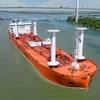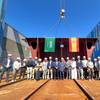DHS Announces West Coast Maritime Radiation Detection Project
DNDO anticipates investing roughly $10 million in the pilot program. The Puget Sound region and San Diego, with DNDO assistance, will leverage existing federal grant funding to support small vessel radiation detection programs and the procurement of recommended equipment. DNDO expects to deploy non-intrusive, passive detection sensors, such as human-portable radiation detection equipment, mobile sensors, and fixed-position detectors. The goal of the program is to evaluate the efficacy and begin to facilitate the use of radiation detection equipment by local authorities and maritime partners as part of their routine operations in the maritime environment. A small vessel is defined as any watercraft that is generally less than 300 gross tons. Small vessels include commercial fishing vessels, recreational boats and yachts, towing vessels, uninspected passenger vessels, or any other small commercial vessels involved in foreign or U.S. voyages. The definition distinguishes small vessels from large commercial vessels and yachts, generally 300 gross tons and over, that are subject to security regulations already put in place under the authority of the Maritime Transportation Security Act of 2002 and the International Ship and Port Facility Security Code. The West Coast Maritime pilot program is underway at Puget Sound, with initial assessment activities beginning in July, and will start soon in San Diego. DNDO will be working with maritime partners and local authorities in both areas to assess the geographic configurations of the ports to maximize detection and interdiction opportunities. Additional analyses for local partners will include a baseline survey of the existing radiological and nuclear detection architecture, a gap and risk assessment, and associated recommended actions to be developed in conjunction with maritime stakeholders. Maritime stakeholders will also receive guidance from DNDO on operational protocols, training, and exercises that support small vessel radiation detection capabilities.













